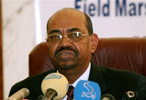
Last Monday, Chadian President Idris Deby made his first visit since 2004 to Khartoum, a sign of improving relations between the hostile neighbors. However, efforts by the Chadian and Sudanese governments to mend their relations will only have a positive impact on the security situation in Darfur if each government takes positive steps to resolve their internal conflicts.
Both Deby and Sudanese President Omar al-Bashir have once again promised joint efforts to secure and develop the border and spoke at length of the beginning of a new era in Sudan-Chad relations. Said Bashir, as quoted by the BBC:
"Deby and I are here to confirm to the Sudanese-Chadian people that we have turned the page of our differences and disputes between the two states. From today, our common battle is the realization of peace, security and stability for the affluence of the people of the two states."
Since 2005, the two countries have fomented the other’s rebel movements through the provision of material and logistical support, and safe harbor. Hostilities reached a boiling point in early 2008, when Khartoum-backed Chadian rebels attacked the capital of N’Djamena and a Chadian-backed rebel group advanced on Khartoum. Several attempts to broker a settlement ended in failure, as neither side had genuine interest in ending the conflict.
Even this time around, rapprochement will likely be short-lived. Continued friendship between Chad and Sudan depends largely on Deby fulfilling his promise to push Darfuri rebel group JEM, based in Chad, back onto Sudanese territory. To do so would come at a huge political price to the Chadian president, whose largely Zaghawan support base (also the dominant ethnicity of JEM) may actively resist the decision. Given the fragility of Chad’s institutions, it is also likely that pieces of the state apparatus, notably Zaghawan commanders in the Chadian army, may simply continue support to the Darfuri rebels.
For Sudan, which fights wars by proxy and still seeks a military solution in Darfur, the maintenance of armed Chadian rebels in North Darfur is an appealing strategy. Khartoum, possessing little ground capacity in the region, is dependent on maintaining a rebel presence in North Darfur to counter the potential return of JEM. Conveniently, the presence of Chadian rebels in the North has also led to increased insecurity in the state, with reports of civilian atrocities filtering back.
Without a political settlement for Darfur and greater transparency and political freedom in Sudan and Chad, rebellion and violence will likely continue and Chad-Sudan relations will remain fragile. In Darfur, at least, momentum for a peace agreement seems to be growing —it’s about time international mediators capitalize on the opportunity.
Photo: Sudan President Omar al-Bashir.

